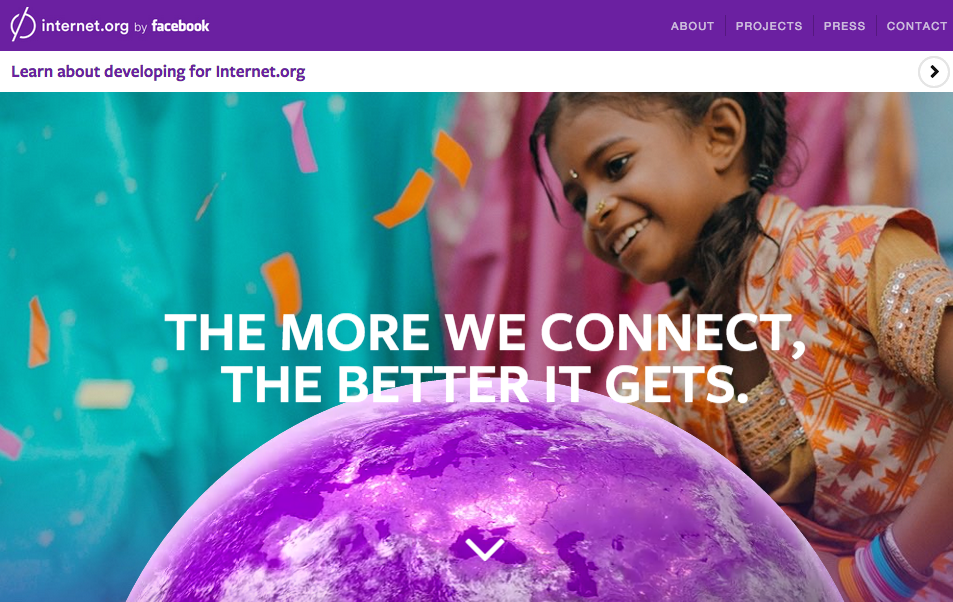Online mission

Internet penetration in many developed countries is approaching 100 percent. This means that soon the growth in the number of users of Internet services will slow down significantly. The only source of influx of new users are third world countries, where the Internet is not available for technical and financial reasons. Internet giants, primarily Facebook, decided not to wait until the technologies in these countries develop by themselves to the western level.
Internet as a gift from Facebook
In 2013, Mark Zuckerberg announced a new unusual Facebook project - Internet.org. As part of this project, the company decided to provide free access to the most useful and popular sites in third world countries.
Zuckerberg argues that connecting to the Internet is one of the most important human rights. But at the same time, of the seven billion people on Earth, less than three have access to the network. The problem most often is not the lack of communication, but its too high cost, since 85 percent of the world's inhabitants live in regions where there is a network.
Therefore, Facebook, in partnership with mobile operators, began launching Internet.org applications in developing countries with free access to 10-20 Internet services. Among them are the UN online projects on health and protection of the population, Wikipedia, Google search, a weather forecast service, media sites, as well as communication services Facebook and Facebook Messenger.
Facebook has already launched Internet.org in Colombia, India and four African countries: Zambia, Kenya, Tanzania and Malawi. In less than a year, more than a billion people have begun using the application.
Internet Mission
Problems began at the moment when the project was launched in six states of the most developed of these countries - India. The application, among others, included the sites of Times Group, India Today, NDTV, IBNLive, NewsHunt and BBC. But then the Times Group stated that Internet.org violates the principle of network neutrality * as it provides free access to selected sites.
* Network neutrality is a principle by which telecommunication service providers do not give preference to one service over another.
However, the Times Group does not want to leave the project alone, as this will give advantages to its competitors who remain in it. Therefore, the media holding offers all the media to go out simultaneously.
Zuckerberg claims that Internet.org is combined with the principle of network neutrality, as it helps people in developing countries to get at least some opportunities for communication and information exchange. It is worth noting that Facebook has never positioned the project as volunteering and initially stated that the project’s goal is to attract more users by increasing Internet coverage in developing countries. But at the same time, Zuckerberg claims that he does not plan to make money on this project, since users of third world countries are unlikely to bring profit to the company.
The Facebook project is reminiscent of religious missions. When all the western countries had already decided on faith, the priests went to introduce their currents in the third world countries. Similarly, Facebook has reached the ceiling of users in developed countries and is now forced to provide the Internet at its own expense in the rest of the world in order to continue to grow.
Fighting drones
An application with free access to the most important sites according to Facebook is not the only tool with which the social network wants to get new users. The company also plans together with its project partners Ericsson, MediaTek, Nokia, Opera, Qualcomm and Samsung to create cheap smartphones, develop simplified versions of applications and new formats for compressing and caching data, as well as introduce cheaper mobile communication tariffs.
The social network also has more futuristic projects - launching drones that will deliver wireless Internet to remote areas of the planet so that their residents can use the Internet. To do this, the company in 2014 bought the British aerospace company Ascenta.
The same startup tried to acquire Google, but Zuckerberg got ahead of him, and then the company bought another drone developer - Titan Aerospace. Google is also going to deliver the Internet to remote areas of the Earth, and not only with the help of Titan Aerospace drones. The company had previously tested helium-filled balloons designed for the same purpose in New Zealand and Australia. All these developments are carried out by the Google science lab as part of the Loon project. Internet balloons fly at an altitude of 20 kilometers above sea level.
This is not Google’s first Internet access project. In 2010, the company began to provide the services of an Internet and television provider under the Google Fiber brand. The Internet giant has conducted broadband access in areas of the United States lagging behind Internet penetration. Now Google plans to launch its own virtual mobile operator, which will not have roaming. Media reported that the company is already in talks with Hutchison Whampoa Corporation, the owner of mobile operators that operate in many countries in Asia and Europe.
Elon Musk, founder of SpaceX Space Corporation and Tesla Motors electric car manufacturer, also plans to tackle Internet access in the world. At the end of 2014, the media reported that it was going to launch 700 telecommunications satellites. So far, the Mask project, as well as the Facebook and Google drone launch programs, are only at the initial stage of development, but companies are not going to stop fighting for new users.
